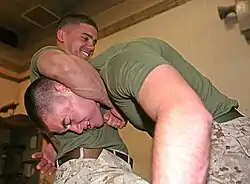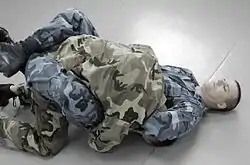| Guillotine choke | |
|---|---|
 Applied standing | |
| Classification | Chokehold |
| Style | Judo, Jujutsu, Brazilian jiu-jitsu |
| AKA | Mae Hadaka Jime |
The guillotine choke, also known as Mae Hadaka Jime (前裸絞, "front naked choke"; compare to a rear naked choke) in judo, is a chokehold in martial arts applied from in front of the opponent, often on the ground but can also be done while standing.[1] The choke involves using the arms to encircle the opponent's neck that bears a resemblance to the blade of a guillotine.
Application

The technique is either a type of tracheal compression restraint (wind choke) that prevents air flow to the lungs, or a blood choke depending on how and where pressure is applied, the trachea versus arteries respectively.[2] It can be applied both standing and from the ground, and can be used as a defense against a double leg takedown.[3][4]
When executed from the ground, the person applying it will try to control the opponent by the hips, for instance using a closed guard. This is done to prevent the opponent from escaping the hold, and to be able to apply additional pressure by extending the hips. It is a very effective maneuver when performed correctly.
The arm is wrapped around the trachea and the hands are clasped. Pressure is applied upwards to restrict blood flow to the head, eventually causing unconsciousness and, if applied for more time, even death. It is taught in various grappling martial arts and is considered universal to grappling, including Jujutsu, Brazilian jiu-jitsu, Judo, as well as in mixed martial arts competition and exists as one of the most instinctive chokes.[5]
The Guillotine can be applied either solely around the opponent's neck or including an arm, with the standard guillotine taking 8.9 seconds to render someone unconscious and an arm-in guillotine taking 10.2 seconds on average.[6]
Following the match between Conor McGregor and Dustin Poirier, during UFC 264 where McGregor attempted a guillotine choke, fighter Israel Adesanya commented on why he avoids attempting the choke in matches.[7] Adesanya claimed that one of the choke's largest drawbacks was that it left the individual attempting it underneath his opponent.[8]
Description
The 2002 U.S Army Combatives field manual dictates that the fighter should first ensure that the enemy's head goes underneath one of their arms. The fighter wraps their arm around the enemy's head and under their neck. The fighter's palm should be facing their own chest. With the other hand, the fighter grasps the first hand, ensuring that they have not reached around the enemy's arm, and pulls upward with both hands. They now sit down and place the enemy within their guard, and finish the choke by pulling with their arms and pushing with their legs.[9]
References
- ↑ Petermann, Hans-Erik (2006). Jiu Jitsu: The Essential Guide to Mastering the Art. Blue Snake Books. ISBN 978-1-58394-169-0.
- ↑ Williams, Michael John (2014-06-29). The Basics of Brazilian Jiu Jitsu. Michael John Williams. ISBN 978-1-291-50031-8.
- ↑ Defense, U. S. Department of (2017-03-15). Fight Like a Marine - Close Combat Fighting (Official U.S. Marine Handbook): Learn Ground-Fighting Techniques, Takedowns & Throws, Punching Combinations & Kicks; Advanced Weapons Techniques & Defense Against Armed Opponent; Attacking from Side and in Guard…. e-artnow. ISBN 978-80-268-7511-6.
- ↑ Ferguson, Rhadi; Scott, Steve; Zerling, Andrew (2015-10-23). Mixed Martial Arts: Analyses of Techniques and Usage. Via Media Publishing. ISBN 978-1-893765-19-1.
- ↑ Hudson, David L. Jr. (2009-05-13). Combat Sports: An Encyclopedia of Wrestling, Fighting, and Mixed Martial Arts. ABC-CLIO. ISBN 978-0-313-34384-1.
- ↑ Jones, Phil (2021-03-31). "Scientists Confirm Which Chokes Put People To Sleep The Fastest". Jitsmagazine.com. Retrieved 2021-07-18.
- ↑ Hill, Glynn A. (July 11, 2021). "Conor McGregor suffers broken leg at UFC 264 as Dustin Poirier wins third clash of rivals". The Washington Post. Retrieved July 18, 2021.
- ↑ Sharma, Deepit (2021-07-12). ""This is one of the reasons I don't jump for guillotines" - Israel Adesanya on Conor McGregor's surprise submission attempt at UFC 264". www.sportskeeda.com. Retrieved 2021-07-19.
- ↑ "FM 3-25.150 (FM 21-150): COMBATIVES" (PDF). www.army.mil. Washington D.C.: HEADQUARTERS DEPARTMENT OF THE ARMY. January 18, 2002. Retrieved July 18, 2021.
External links
![]() Media related to Guillotine chokes at Wikimedia Commons
Media related to Guillotine chokes at Wikimedia Commons